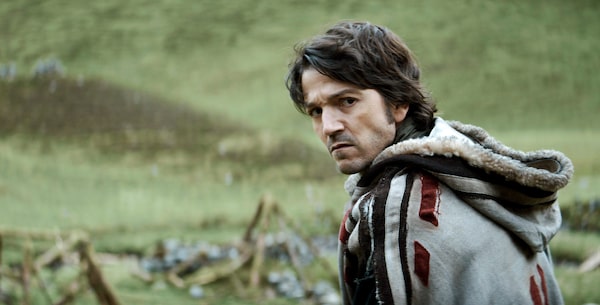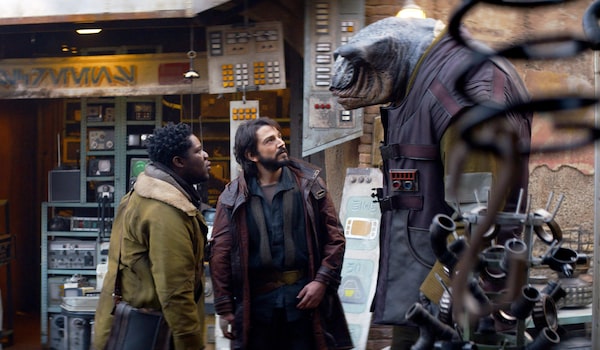
Diego Luna as Cassian Andor in Andor.Lucasfilm Ltd./Disney+ via AP
After producing five movies, three television series and too many scuttled productions to tally, the benevolent Disney empire has finally delivered a new Star Wars show that rivals George Lucas’s initial trilogy in its depth and inventiveness – and almost no one seems to care.
Andor, which wrapped up its first season on Disney+ this week, has turned out to be a franchise miracle. Created by Tony Gilroy (Michael Clayton, the Bourne series), who was brought in to rework patches of Disney’s first-ever “standalone” Star Wars film Rogue One back in 2016, is something that Disney has been reluctant to offer ever since the corporate behemoth purchased Lucasfilm. It is a bold, beautiful, juicy space-opera drama, with nary a lightsaber in sight.
Certainly, Andor is beholden to arcane trivia culled from the furriest corners of Wookieepedia, and it must above all fit snugly into the Talmudic-like Star Wars timeline, in this case taking place roughly five years before the events of Rogue One, which itself takes place approximately five minutes before the beginning of Episode IV: A New Hope. But that is where the canonical obligations (mostly) stop.
Ostensibly following the adventures of thief and future rebellion leader Cassian Andor (Diego Luna, reprising his fan-favourite character from Rogue One), Gilroy’s series is actually all about exploring the muck of everyday reality of a galaxy trapped under a fascistic thumb. As Cassian goes from small-planet crook to lightspeed-hopping hero, Andor digs into the dirty, previously unexplored corners of Star Wars: labour camps, imperial torture chambers, bureaucratic hell-scapes, even space brothels. Along the way, Gilroy dips into well-worn crowd-pleasing genres – the heist film, the prison-break movie, the political thriller – to give each chunk of the season a distinctively cinematic texture.
Admittedly, the first two episodes of Andor – minus the series premiere’s noir-esque cold open – are total bores, and can be skipped over entirely. But once Gilroy tosses such heavy-hitting, scenery-chewing actors as Stellan Skarsgard and Andy Serkis into the mix (with Rogue One’s Forest Whitaker back in action, too), the entire production levels up to the point of extreme binge-ability.
Gilroy and his team have crafted a tense, thematically complex drama that is more concerned about real-world drama than pew-pew blaster fights. Andor’s world is about the punishing reality of living under occupation – the moral and ethical grey lines that accompany acts of wartime rebellion. It is, a few kooky aliens and stuttering droids aside, firmly adult storytelling that rivals Ronald D. Moore’s reboot of Battlestar Galactica for top-tier sci-fi Trojan horse television. The setting might be fantastical, but the themes and characters are purely relatable, decidedly complicated and wildly entertaining. Andor offers a What If...? vision for what would happen if HBO, not the Mouse House, acquired Lucas’s intellectual-property vault a decade ago.

Andor’s plight to attract headlines mirrors Cassian and his fellow rebels’ own struggles.Lucasfilm Ltd./Disney+ via AP
Which, I suppose, also explains why what little viewership data are available for Andor suggest that Disney+ subscribers would much rather be watching that cute little Baby Yoda (sorry, Grogu) zip around space every week on The Mandalorian. Or, far worse, endure Ewan McGregor trying to make something out of nothing with this past summer’s painful Obi-Wan Kenobi miniseries.
While Disney+ has confirmed that Andor is indeed getting a second season to wrap things up – there is, after all, only so much you can tell of Cassian’s story given that all narrative roads lead to Rogue One – the lack of general-audience enthusiasm for Gilroy’s series is depressing. Finally, fans who grew up with Lucas’s original Star Wars films have been gifted a story that has matured (in theory) as much as they have. Yet it is mostly being ignored by all but the most hardcore of fans, or curious franchise onlookers who picked up on the series’ growing critical acclaim.
Andor’s plight to attract headlines mirrors Cassian and his fellow rebels’ own struggles – how do you get people to listen to something important when they are used to the deafening din of white noise? In Andor’s universe, it’s the gradual fascistic grip of the Empire’s war on independence that causes many of the galaxy’s inhabitants to stick their heads in the sand. In ours, it’s just the never-ending thrum of the streaming war that makes it hard to concentrate – making the above comparison a little crass, sure. But sometimes you have to play a little down and dirty to win. And every new viewer who discovers Andor represents one data point for Disney to keep investing in more high-minded Star Wars stories, and fewer Grogus. Sorry, little buddy.